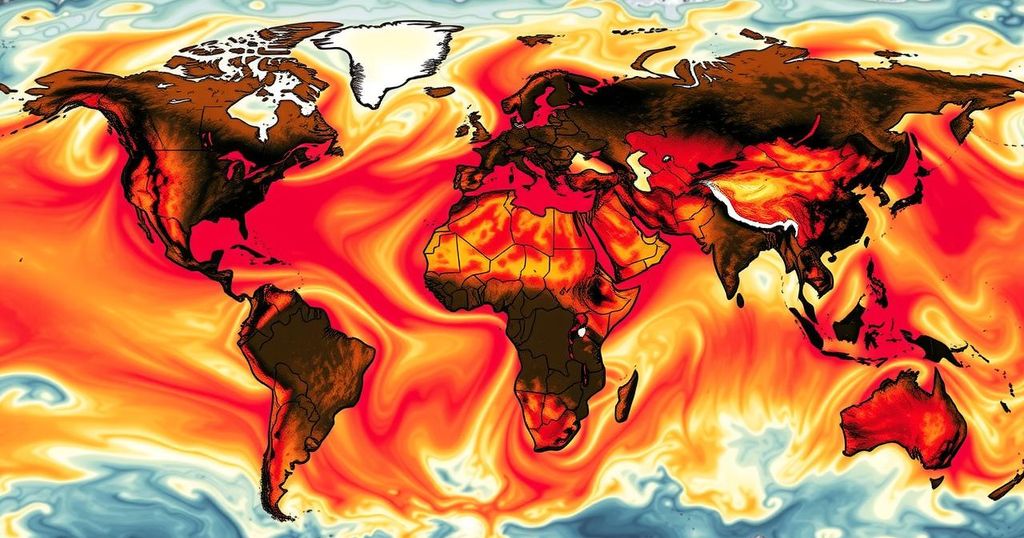Climate agencies have confirmed that 2024 is the hottest year on record, surpassing 2023. Key factors include greenhouse gas emissions and the El Niño phenomenon, resulting in extreme weather events worldwide, including devastating storms and droughts. Experts link these patterns directly to human-induced climate change. The global temperature increase hangs perilously close to crossing the critical 1.5 degrees Celsius threshold established by the Paris Agreement, necessitating urgent actions to mitigate climate change impacts.
Recent confirmation from climate science agencies such as those from the United States, United Kingdom, Europe, and Japan indicates that 2024 marks the hottest year on record, surpassing the previous year’s heat levels fueled by greenhouse gases. The Copernicus Climate Change Service (C3S) reported that both annual average sea surface temperatures and atmospheric water vapor reached unprecedented highs this year, resulting in severe weather phenomena, including intense storms and flooding.
Samantha Burgess, Deputy Director of C3S, highlighted the dire consequences of these elevated temperatures, stating, “These high global temperatures, coupled with record global atmospheric water vapor levels in 2024, meant unprecedented heat waves and heavy rainfall events, causing misery for millions of people.” NASA’s Gavin Schmidt further emphasized the direct link between human-induced climate change and recent extreme weather events, asserting that analyses demonstrate that current heat waves and heightened rainfall patterns are largely attributable to anthropogenic warming.
Among the notable extreme events in 2024 were Hurricane Helene, which resulted in over 230 fatalities across multiple states in the U.S., along with significant heat waves in Mexico and flooding in Spain. NOAA’s Russell Vose mentioned that rising temperatures will increasingly contribute to extreme weather, compounded by factors such as natural variability and increased human habitation in vulnerable areas.
Contributing factors to 2024’s climate conditions include the El Niño phenomenon and decreased global cloud cover allowing for increased solar radiation absorption. However, the predominant influence remains the accumulation of greenhouse gases from fossil fuel combustion. Schmidt warned, “The global mean temperature will continue to rise as long as we continue to emit greenhouse gases.”
Each year of the last decade remains among the ten warmest recorded, with last year temporarily exceeding the critical threshold of 1.5 degrees Celsius above pre-industrial levels as outlined in the Paris Climate Agreement. Burgess noted, “We are now teetering on the edge of passing the 1.5 Celsius level defined in the Paris Agreement, and the average of the last two years is already above this level.”
Current estimates from NASA and NOAA suggest that global temperatures since the preindustrial era are nearing this pivotal mark. Climate scientists like Michael E. Mann express concerns that without immediate action to curb carbon emissions, this threshold will be crossed in approximately a decade. Mann advocates for focusing on minimizing every increment of future warming, emphasizing the ongoing catastrophic effects of warming already manifested in events such as the widespread wildfires in Southern California this year.
The summary provided highlights the urgent issue of climate change and its impact on global temperatures, extreme weather events, and human safety. The record-high temperatures and severe weather phenomena are seen as direct consequences of rising greenhouse gas emissions, mainly from human activities such as fossil fuel combustion. International agreements like the Paris Climate Accord set critical temperature thresholds aimed at mitigating the worst impacts of climate change. The acknowledgment from scientific agencies about the alarming trend reflects significant concern and the call for immediate, collective action to address climate issues at a global scale.
In conclusion, the assessment of 2024 as the hottest year on record underscores the urgent impact of climate change driven by greenhouse gas emissions. The resulting extreme weather events pose serious risks to human welfare and highlight the interconnectedness of climate science, policy, and public safety. As scientists warn of further temperature increases and associated disasters, the need for immediate and effective climate action is more critical than ever to curb future warming and limit the severity of impending consequences.
Original Source: www.newsweek.com






